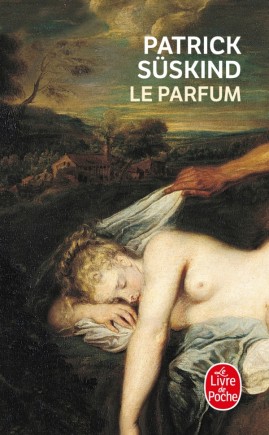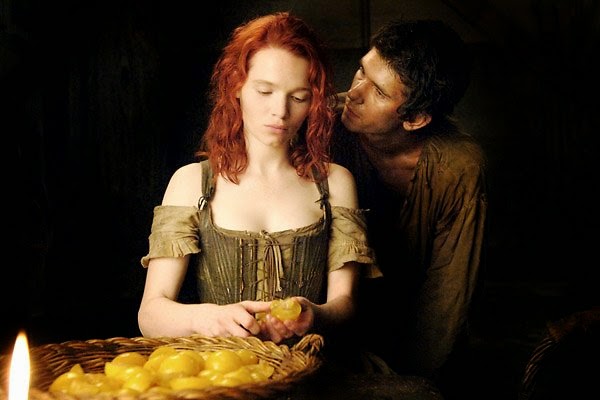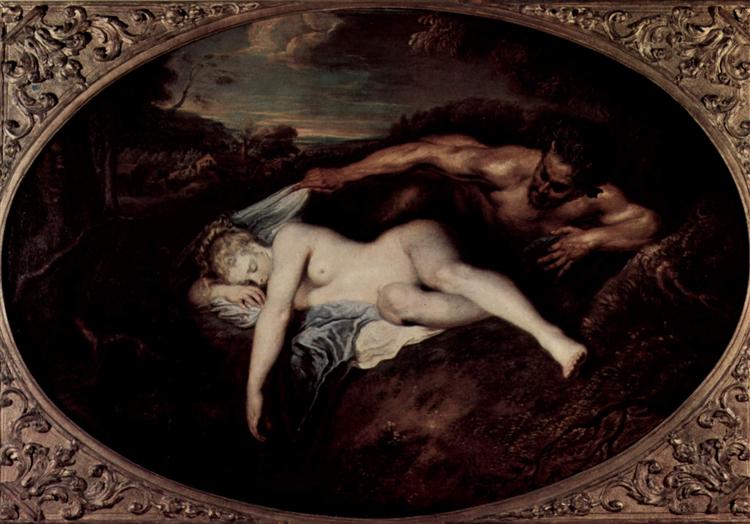Le Parfum subtitled Histoire d'un meurtrier is the first novel by the German writer Patrick Süskind, published in 1985. A real success since its publication, Le Parfum is one of those unclassifiable books as it is singular. Indeed, the book is a true ode to the sense of smell plunging the reader into an unprecedented olfactory journey. The novel has since been adapted into a film by Tom Tykwer in 2006. Then, in 2018, we find on the Netflix platform, Le Parfum, a German series in six episodes that is freely inspired by history to transpose it to the twenty-first century.

In the heart of the eighteenth century
The story begins in Paris in the cemetery of the Innocents, July 17, 1738. That day, in this place that served as a market, Jean-Baptiste Grenouille, the protagonist of the novel, was born, between two stalls of fresh products, in a deep precariousness. It is through this character that Patrick Süskind gives us a living painting of eighteenth-century French society, in a pre-revolutionary France. The author meticulously describes the living conditions of the time, between the different professions, social relations, popular beliefs and superstitions and the philosophy of the Enlightenment present among the intellectual elite.
From the first pages, the Parisian population appears violent and dirty. The author manages to accurately transcribe the foul smells that emanate from people, between smells of sweat, odors related to work, the environment, sex. After experiencing a poor Paris with deplorable hygienic conditions, Jean-Baptiste Grenouille takes us to Auvergne, Montpellier, Grasse and finally again to Paris. His trip allows us to discover different French landscapes giving us what it was like to live on the roads in the eighteenth century.
The portrait of a character both dark and fascinating

Le Parfum traces the life of Jean-Baptiste Grenouille, from his birth to his death. He is a very singular being by his ugliness, by his absence of body odor and by his extraordinary sense of smell. On the first day of his existence, he perceives and discovers the world with his nose. Possessing an excellent olfactory memory, he remembers with accuracy all the smells he has smelled throughout his life, even the most imperceptible. Composing a real mental repertoire, he is also able to assemble perfumes and dissect them into aroma segments.
If, from the outset, the character appears as a hero thanks to his unique and exceptional gift that fascinates, he is also an anti-hero. Ambivalent, he is described as "one of the most brilliant and abominable characters of that time", a being whose "genius and unique ambition were limited to a domain that leaves no trace in history: the evanescent kingdom of smells". This ambivalence is also highlighted by its unusual nose and its absence of smell. Devoid of emotions and any notion of right and wrong, he lives only for his quest to create the most perfect perfume essence in the world: a captivating perfume. This quest leads him to commit a series of murders, in a life punctuated by violence and uncertainty.
A world bathed in smells as the only reality
Throughout his childhood, he knows only rejections. First that of his mother. An unwanted child, he is abandoned at his birthplace. In a pile of garbage, he is saved in extremis thanks to his screams. For this first rejection, his mother will pay the ultimate price: that of her life. Beheading for infanticide. He is then taken in by a nurse, only to be rejected. Then, by a monk. Later, by a woman who had taken him in at home for money. But, each time, the same refrain. It always ends up being abandoned. For its lack of smell, its strange way of smelling people, its repulsive appearance and its lively appetite. After the rejection of the nannies, comes the rejection of the apprenticeship masters. It is therefore on the margins of society that Jean-Baptiste Grenouille spent his childhood.
Like a tick, little John the Baptist, resistant to all diseases, decided to cling to life, patiently and indefinitely. Gradually, he begins to become aware of the smells that surround him. First, in a tanner in apprenticeship, he discovers the most foul odors, with great interest. Then, he begins to stroll through the alleys of Paris, to break down all the smells of the capital until he knows them entirely. It is then a whole world bathed in smells that is offered to him, smells as being his only link with the reality of the world. Indeed, without his exceptional sense of smell – his only enjoyment – the existence of Jean-Baptiste Grenouille would have no meaning. He would be nothing.
In search of pure essence: a quest for identity

On the evening of September 1, 1753, an event disturbed the heart of his insignificant existence. He crosses the path of a young red-haired girl, in the rue des Marais, whose unspeakable smell disturbs little Jean-Baptiste. For the first time in his life, he feels a violent emotion. Then begins his quest. Wanting to possess this divine perfume to infinity, he kills the girl. From then on, he found meaning in his life: "to know the secret to be able to preserve the smells. » Thus, he began an apprenticeship with a master perfumer and was particularly interested in distillation techniques (to seize the smell of flowers for example) and enfleurage. Following his three years of apprenticeship, he began an initiatory journey to Grasse, the capital of perfume.
On the way, he makes a puzzling discovery: he can't stand the smell of men. This leads him to isolate himself from the rest of the world, in a cave of a volcano in Auvergne. He remained there for seven years. Alone and disconnected from reality, he creates his own kingdom of smells, continually thinking about the perfume of the red-haired girl. One night, dreaming of his own smell, he realizes that he has none. This terrible observation leads him to leave the cave in search of his identity. No smell, no identity.
He then creates a perfume to have a human smell, allowing it to exist. His reflection goes far beyond that, since for him, the one who " [masters] smells, [masters] the hearts of men ". Always driven by his pathological obsession, he seeks to make a perfume capable of dominating others. In Grasse, he integrated into society by acquiring an important social status: that of a prestigious perfumer, recognized for his genius.
The absolute perfume in the face of death

The arrival of Jean-Baptiste Grenouille in the city, brings a series of murders with the same modus operandi. The whole city falls into a state of psychosis. It is no less than twenty-four young virgin girls that the perfumer kills in order to appropriate their smell. But his last crime – the twenty-fifth – is one too many, which leads him directly to capital punishment. Nevertheless, he manages to escape it thanks to his perfume: the absolute perfume. Intoxicated by the efflux, the crowd sees in him, the incarnation of a pure and innocent being, like an angel fallen from heaven. After pardoning him, the crowd turns into a veritable orgiastic scene, allowing the condemned to flee his sentence. He left Grasse to return to Paris. Now his quest is complete. He managed to create an "apotheotic" essence.
Nevertheless, having fulfilled an almost divine destiny, he no longer finds meaning in his life and prefers to leave this world. Thus, he returns to his birthplace and sprinkles himself with this absolute scent. The criminals and prostitutes who roam this place like fallen souls, see in him the incarnation of an angel. This is how the existence of Jean-Baptiste Grenouille ends. Skinned in the stinkiest place in Paris, on June 25, 1767, at the age of twenty-eight.
A singular novel with multiple inspirations
Patrick Süskind was probably inspired by the essay Le Miasme et la Jonquille by historian Alain Corbin, published in 1982. It is an essay on the perception of odors from the mid-eighteenth to the late nineteenth century. We also find a similarity with the perfumer Jean Marie Farina, obsessed with scents, like our character, or with the French perfumer Paul Grenouille, who changed his name to Grenoville at the opening of his luxury perfume house in 1879. But the story of Jean-Baptiste Grenouille finds a real echo in the true story of the Spanish serial killer Manuel Blanco Romasanta (1809 – 1863), better known as the "Werewolf of Allariz". He killed several women and children in order to extract fat from their bodies and turn it into soap. Vague resemblance…
At the crossroads of many inspirations, Patrick Süskind delivers us with virtuosity an innovative and unprecedented novel, a novel that paints olfactory landscapes: between foul smells and floral smells. Page after page, smells are omnipresent, pushed to their paroxysm. The author plunges us into a journey that we, readers, are not used to taking, both macabre and poetic. Much more than a story about perfumes, it offers us a reflection on the human condition in a pre-revolutionary French society. But, beyond a historical novel, Le Parfum appears both as a philosophical tale and a detective novel with as main character, a sociopathic killer caught up in a mystical quest. Inverting the value system, it highlights a world where animality dominates over reason. Thus, Jean-Baptiste Grenouille, a true monster, ends his existence with the status of angel and divinity.















![[Live Report] Rock En Seine 2024 : 20 ans et toujours aussi passionnés !](https://www.justfocus.fr/wp-content/uploads/2024/11/RES24_JOUR01_LANA-DEL-REY_LOUIS-COMAR-12.jpg)





















![[Critique] Seuls – cycle 1 : La bande dessinée qui a inspirée le film !](https://www.justfocus.fr/wp-content/uploads/2017/01/Seuls_Logo_Dupuis.jpg)
